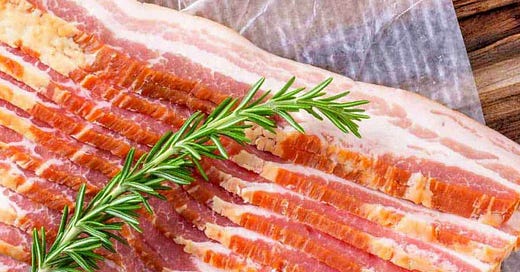🐷🍁 Canada Gets 'Gene Edited' Bacon They Never Asked For...
And it doesn't even have to be labeled as such!
Author: Dr. Sylvain Charlebois at The Toronto Sun
Gene-edited meat is coming to Canada, but without transparency or labeling, consumers won’t know it—threatening the trust that holds our food system together.
In April, the U.S. Food and Drug Administration (FDA) approved the commercial distribution of pigs genetically edited with CRISPR technology to resist porcine reproductive and respiratory syndrome (PRRS), a costly and widespread disease in pork production. These pigs are expected to enter the American market in 2026. Yet Canadian consumers could start seeing gene-edited pork products in stores — unlabelled and unannounced — as early as next year.
CRISPR is a powerful gene-editing tool that allows scientists to alter DNA with high precision. In agriculture, the technology holds enormous potential. In the case of pigs, it was used to disable a gene that makes animals susceptible to PRRS, eliminating the need for antibiotics or medical interventions. The goal is simple: increase productivity, reduce losses, and stabilize the food supply chain. But whether this aligns with consumer expectations remains a separate — and unresolved — question.
Canada imported more than US $850 million worth of U.S. pork last year, according to the National Pork Producers Council. So regardless of Canadian regulatory decisions, gene-edited meat is coming. And yet, no label will tell you whether your pork chop or bacon came from a genetically altered animal.
That lack of transparency is precisely what Quebec-based duBreton, North America’s leading organic pork producer, is warning against. The company argues that gene editing is incompatible with organic and humane production standards — and more importantly, with informed consumer choice. Whether or not gene-edited meat poses a food safety risk isn’t the central issue. The issue is whether consumers have the right to know how their food was produced.
It’s not the first time Canada has faced this dilemma. Genetically modified (GM) salmon was approved and introduced in Canadian markets several years ago — without mandatory labelling. Major retailers ultimately rejected the product due to consumer backlash, and the company behind it, AquaBounty, eventually relocated its operations outside Canada. That case serves as a cautionary tale: even if a technology is deemed safe, consumer perception can dictate its commercial fate.
In contrast, GM technology has long been accepted in grain production. Genetically modified ingredients—largely from corn, canola, and soy — are now commonplace in processed foods. These technologies have contributed to yield stability and lower input costs for farmers. But even in grains, labeling remains inconsistent, and the average consumer still doesn’t know which products contain modified ingredients.
What’s different in livestock is the emotional and ethical connection people have with animals and meat. A pork chop isn’t just a commodity — it represents values tied to animal welfare, sustainability, and trust in the food system. That’s why gene editing in livestock raises more scrutiny than it has in crop science.
To be clear, gene editing isn’t inherently a bad thing. It could play a vital role in global food security, particularly as we face mounting pressures from climate change, animal disease, and rising production costs. But the rollout matters. And the food industry has historically failed to bring the public along when introducing breakthrough technologies.
The failure isn’t scientific — it’s strategic. Rather than building a transparent narrative around innovation, the industry has often opted for silence, leaving the public to fill in the blanks. That vacuum has been seized by special interest groups, some of which traffic in fear and misinformation. The “Frankenfood” rhetoric may have been overblown, but it did shine a light on an ethical principle we should not ignore: consumers deserve to know.
Labelling gene-edited products is not about fear — it’s about trust. Informed choice is the cornerstone of any credible food policy. Consumers don’t need to be protected from innovation, but they do need to be respected. The question is not whether gene-edited meat should exist; it’s whether its presence should be hidden.
On that front, duBreton is right to raise the alarm. If gene editing truly delivers benefits to farmers, processors, and consumers, then let’s have that conversation openly — with proper labeling, sound science, and the transparency Canadians expect from a modern food system.
— Dr. Sylvain Charlebois is the Director of the Agri-Food Analytics Lab at Dalhousie University and co-host of The Food Professor Podcast
🍽️ Food Videos on My Rumble Channel








How revolting! I reckon our bacon has been tampered with in Australia.
Well, that’s one way to rip the fking skin off of a cultural norm: inject one of their main food staples with unknown substances and feed it back to them.
Oh.
And guess which filthy sickening archaic abusive INVADING pedo and
female-hating death cult DOESN’T eat pork?
How conveeeenient for the cabal overlords.